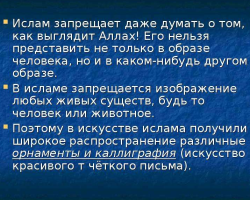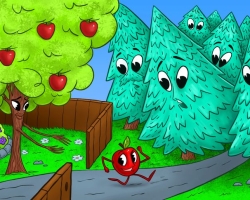Want to know where the famous phrase “who is well done? I'm fine fellow!"? Read the article, it describes several popular sources.
Content
- What is the source of the phrase “Who is well done? I am well done! ”: Madagascar and King Julian
- “Who is well done? I'm fine fellow!" - Where to hear: Leningrad and Labuten
- Video: Leningrad - Exhibit
- “Who is well done? I am well done! ": Affirmations
- The phrase "Who is well done? I'm fine fellow!" In everyday life
- “Who is well done? I'm fine fellow!" -Where does the phrase come from: the film "Father-little"
- “Well done, like a salty cucumber”: Where does the phrase come from?
- Video with the phrase "Who is well done? I'm fine fellow!"
- Video: Who is well done? I'M FINE FELLOW! Leningrad is an exhibit
It often happens that the phrase from the film, book or cartoon after some time is winged. The “starting point” is the moment when it begins to actively quote not only by other representatives of culture and art, but also by ordinary people.
Read another article on our website about beautiful quotes, jokes and cool phrases about vacation, rest at sea, sun, beach. You will find original words that you can even put in status in social networks.
This is how the expression became: “Who is well done? I'm fine fellow!"The popularity of which is still not fading on the network and reality. The fact of distribution is explained quite simply: self -praise is effective and always pleasant. Who said this phrase? Where is it used? You will find answers to these and other questions in this article. Read further.
What is the source of the phrase “Who is well done? I am well done! ”: Madagascar and King Julian

The first source in which the statement slipped “Who is well done? I'm fine fellow!"The cartoon is considered "Madagascar"released in the distant 2005. Exclamation uses king Lemurov Julian. The high self -conceit of the animal and its tendency to self -enforcement for every possible reason, people were very fond of all over the planet.
Charisma of Julian and other heroes did not leave indifferent not only children, but also adults. That is why today the phrase is used everywhere, about and without.
“Who is well done? I'm fine fellow!" - Where to hear: Leningrad and Labuten
References to various kinds of literary and artistic sources are not uncommon for modern music. Juliana did not even forget the phrase Sergei Shnurovthe founder and permanent leader of the group "Leningrad".
The heroine of the clip for the song "Exhibit" About Labutenes jumps with joy and screams “Who is well done? I'm fine fellow!".This happens when she successfully agrees on a meeting with a successful gateful business. According to the plot, a girl from a simple family, but dreams of a prince on a white horse. And then, finally, luck smiles at her. Of course, a “hunter for men” does not dream of anything else with joy. Through the phrase, she “charges” herself on a successful date, from which it can extract tangible benefits.
- For three days, the clip scored on YouTube 1.5 million views, glorifying, thereby the actress Julia Topolnitskaya.
But this phrase is not just bragging. This is a kind of affirmation, through which a person inspires himself confidence in his abilities, strengthens self -esteem and receives an incentive for the upcoming life victories. Even more about affirmation is written below. Read further.
Video: Leningrad - Exhibit
“Who is well done? I am well done! ": Affirmations
With the advent of the Internet, the understanding of traditional psychology has expanded significantly. Many esoteric and philosophical practices overgrown with new, interesting terms. Thanks to Louise Hay People learned about the benefits of self -hypnosis (affirmations) for each specific person. In this case, independent work takes place.
After all, not all human complexes and phobias can be fixed even by the most experienced specialist. In some cases, only a person himself is able to help himself. And for this one should learn to accept and love yourself, not only reproach for shortcomings and misses, but also encourage for successes. Pronouncing a phrase of the type “Who is well done? I'm fine fellow!" To himself, and is really able to improve the results of a person in professional, creative, personal and other areas.
Examples:
- I am young, beautiful and successful.
- I am attractive. All men are crazy about me.
- I'm rich. Money flows to me from all possible sources. Soon I will become a millionaire.
- I like sports. Every morning, going on a run, I believe that my body becomes even more slender and fit.
- I am well. All my diseases leave me. If I want, I can live 100 years.
- I can handle all the goals that I set. I will achieve everything I want.
- I am the most talented. A great future, glory and recognition awaits me. The world will be at my feet!
Phrases can be completely different. The main thing is that there is no particle of "not." Naturally, affirmations should be compiled exclusively in a positive way. It is also worth pronouncing them optimistic - exactly as his cult phrase said king Julian.
The phrase "Who is well done? I'm fine fellow!" In everyday life

The statement of the famous lemur from the children's cartoon is suitable for most typical situations and cases. It can be consumed, both by receiving “excellent” on the exam, and conquering the girl of your dreams, both perfectly at the concert and defeating the district chess championship. No restrictions.
Word "well done" It is often used in everyday life and without mentioning lemur. In which cases? Here are a few of them:
- Emotional support for children -Whenever the child does something right, you should praise him- “What a good fellow you are, Petya! Having brushed my teeth without reminders! ”.
- Approval for adults - can be used as bosses - "You are well done, Katerina, they mastered such a difficult project alone"so as friends - "Well done we have Pashka, I recently bought such an expensive car"or second halves - “Honey, what a good fellow you are! How did you know that I have been dreaming of a Japanese style repair for the third year? ”.
- Mockery - phrase "Well, you are well done!" It can be pronounced in a negative way. Irony emphasizes the wrong actions of a person - “Well, you, the topic and well done! Once again ruined everything! ".
Julian’s affirmation is quite important. Phrase “Who is well done? I'm fine fellow!" It is often used in everyday life. Sometimes, if a person does not praise himself, then no one will do this. And getting a kind of promotion for successful works is so pleasant.
“Who is well done? I'm fine fellow!" -Where does the phrase come from: the film "Father-little"
Painting "Father is a good lad" He talks about a dear forty -year -old loser. A man in this film is literally entangled in life problems. But after he meets his children. Since in his youth the main character actively collaborated with a reproductive clinic, he, it turns out, has more than a hundred offspring. Now grateful children want to meet their biological parent. It is thanks to this film that large dads often use a phrase among themselves: “Who is well done? I'm fine fellow!".
“Well done, like a salty cucumber”: Where does the phrase come from?
This statement "Well done like a salty cucumber" I loved the people long before "Madagascar". According to many sources, it originates from folklore and the work of folk tales. When the narrative finished the story, he summed up: "That's the end of the fairy tale, and who listened - well done, like a salty cucumber".
Why is the cucumber? Everything is simple. On the one hand, words "well done" and "cucumber" They rhyme very funny. But fresh cucumber is something young, green, immature. But the salty cucumber is strong, elastic, crisp. Accordingly, a man, “good fellow” in the prime of strength and capabilities, could mean by “salty cucumber”.
As for the first literary source, A. Shardin (aka Pyotr Sukhonin) used this phrase in the historical novel “At the Broadway of two Centuries” (1886).
Video with the phrase "Who is well done? I'm fine fellow!"

The words "well done" and "well done" They differ only by stress. That is why the supporting word "well done" It is also associated with strong, strong, successful epic heroes who do not cowardly and do not retreat on the way to the goal. In a word, "well done" - A kind of real man, a decent person.
Of course, later the word began to be used in relation to both floors. Also, the definition of salt cucumber is "simple, but tasty." Here are good people: they are simple in communication, but pleasant to society. Moreover, the adjective “salty” itself, as it were, hints that the long -stored product can have unpleasant qualities. So it is with people: it is very difficult to guess who will live up to expectations, and who does not. Accordingly, folk wisdom is not just a funny rhyming saying. Although, perhaps the “cucumber” is just one of the few censorship rhymes to the “fellow”, and everything is much easier than you can imagine.
Look at the form with the phrase “Who is well done? I'm fine fellow!"and you will see how for the main character she means a lot:
Video: Who is well done? I'M FINE FELLOW! Leningrad is an exhibit
Read on the topic:







